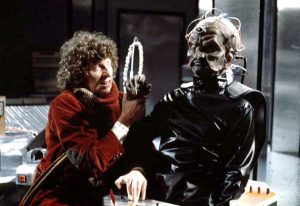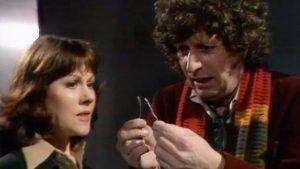Doctor Who: Genesis of the Daleks, starring Tom Baker, Elisabeth Sladen, Ian Marter
I recently re-watched Doctor Who: Genesis of the Daleks courtesy of BBC-TV. I’m glad to say that it reminded me why I fell in love with this TV series. It’s well-written, well-acted, with intelligent themes that make the audience think about the questions raised. If you could go back in time and prevent the birth of Adolf Hitler – would you?
Synopsis of Doctor Who: Genesis of the Daleks
The Time Lords of Gallifrey force their interfering, rogue member – The Doctor – to violate their most sacred laws. They want him to go back in time to prevent (if possible) the creation of the Daleks. The Daleks are xenophobic creatures, encased in mobile tanks, stripped of all emotion except hate. The Time Lords want The Doctor to change the past and prevent their creation. Failing that, at least modify them so that they’re less of a danger to the Universe. Can he? Should he?
Review of Doctor Who: Genesis of the Daleks
Doctor Who: Davros, if you had created a virus in your laboratory, something contagious and infectious that killed on contact, a virus that would destroy all other forms of life, would you allow its use?
Davros: It is an interesting conjecture.
Doctor Who: Would you do it?
Davros: The only living thing, a microscopic organism reigning supreme… A fascinating idea.
Doctor Who: But would you do it?
Davros: Yes… Yes…
[raises hand as if holding the metaphorical capsule between thumb and forefingers]
Davros: To hold in my hand a capsule that contains such power, to know that life and death on such a scale was my choice… To know that the tiny pressure of my thumb, enough to break the glass, would end everything… Yes, I would do it! That power would set me up above the gods! AND THROUGH THE DALEKS, I SHALL HAVE THAT POWER!
That encapsulates the conflict in Doctor Who: Genesis of the Daleks. Davros is a brilliant scientist, though physically twisted. He’s restricted to his chair because of the chemical and radiation warfare between his people and another on his home planet of Skaro. The Doctor (Tom Baker) with the aid of two human companions – reporter Sarah Jane Smith (Elisabeth Sladen) and UNIT sergeant Harry Sullivan (Ian Marter) try to stop the creation of the Daleks with nothing more than their ingenuity and The Doctor’s knowledge.
He who hesitates …
At crucial times, the Doctor hesitates — after all, he’s about to commit genocide against an entire race. And that hesitation has an enormous cost. And Davros has no hesitation. He and his followers are barely disguised as Nazis. This makes total sense since the mentality behind Davros’ philosophy is exactly that.
I’ll not spoil the ending, but I will say that Dr. Who: Genesis of the Daleks is one of the best stories to ever air on television. The special effects, etc. are clearly limited by the limited budget. But the strength of the story and the quality of the acting overcome that.
Doctor Who: Genesis of the Daleks
In six parts:
- The Doctor and his companions Harry and Sarah Jane are sent to the planet Skaro by the Time Lords. To prevent the creation of the Daleks.
- Harry and The Doctor are taken to the Kaled bunker where Davros is preparing to demonstrate the Daleks. Meanwhile, Sarah is captured by the rival Thals and taken to their city as a slave worker.
- Harry and The Doctor head to the Kaled city to alert the authorities to Davros’ plans. While Sarah and Sevrin are forced to work on the completion of the Thals’ rocket.
- The Doctor fails to prevent the Thals from destroying the Kaled city. But they don’t have long to enjoy their victory before the Daleks attack.
- The Doctor is forced to give Davros full details of future Dalek victories. But opposition to Davros’ plans is growing among the Kaleds – soon there is open rebellion.
- Gharman tries to convince the Kaleds to vote against the Dalek project … But Davros has a trick up his sleeve. Meanwhile, the Doctor works to destroy the tape recording of Dalek victory. And the Thals plan an intervention of their own.
Editorial review of Doctor Who: Genesis of the Daleks courtesy of Amazon.com
One of the most popular story arcs from Doctor Who‘s “Fourth Doctor” period (starring Tom Baker as the Doctor), writer Terry Nation’s Genesis of the Daleks not only fleshes out the back story of the Doctor’s most fearsome nemeses–the megalomaniacal, robotic Daleks–but also serves up a thoughtful storyline that doesn’t skimp on the action. First aired on the BBC in 1975, the six-episode story has the Doctor and companions Sarah Jane (Elisabeth Sladen) and Harry (Ian Marter) summoned to the Daleks’ home planet of Skaro at a time prior to their rise to power. Hoping to prevent the domination-hungry beings from developing their warlike behavior, they soon find themselves in the middle of a war between two races, the Kaleds and the Thals, and uncover a plot by a Kaled scientist, Davros, to render his people invincible as the metal-encased Daleks.
A gripping story with elements that remain topical even today (ancient cultures locked in an endless war, genetic experimentation, eugenics), Genesis of the Daleks is an excellent starting point for first-time Who viewers, and a fine reminder of the show at its best for longtime fans. The two-disc DVD offers a considerable amount of extras, most notably a commentary track by Baker, Sladen, co-star Peter Miles, and director David Maloney. “Genesis of a Classic” is an hour-long featurette about the story, with interviews from all the major (surviving) cast and crew members, while “The Dalek Tapes” explores the creatures’ history via rare clips and interviews with performers and production staff.
There’s also a clip from a vintage episode of the U.K. children’s series Blue Peter that’s devoted to Doctor Who models and creatures, as well as the detailed photo gallery and subtitled text commentary that are standards on all Doctor Who DVDs. Those with DVD-ROM can access PDF documents of the 1976 Doctor Who Annual and listings from the Radio Times. –Paul Gaita




